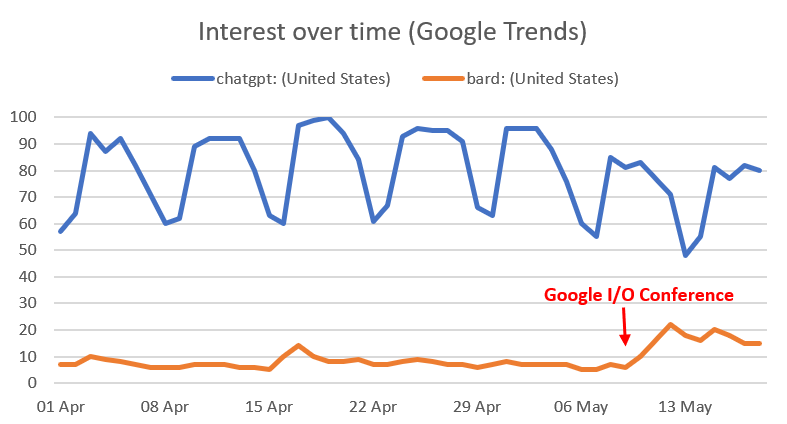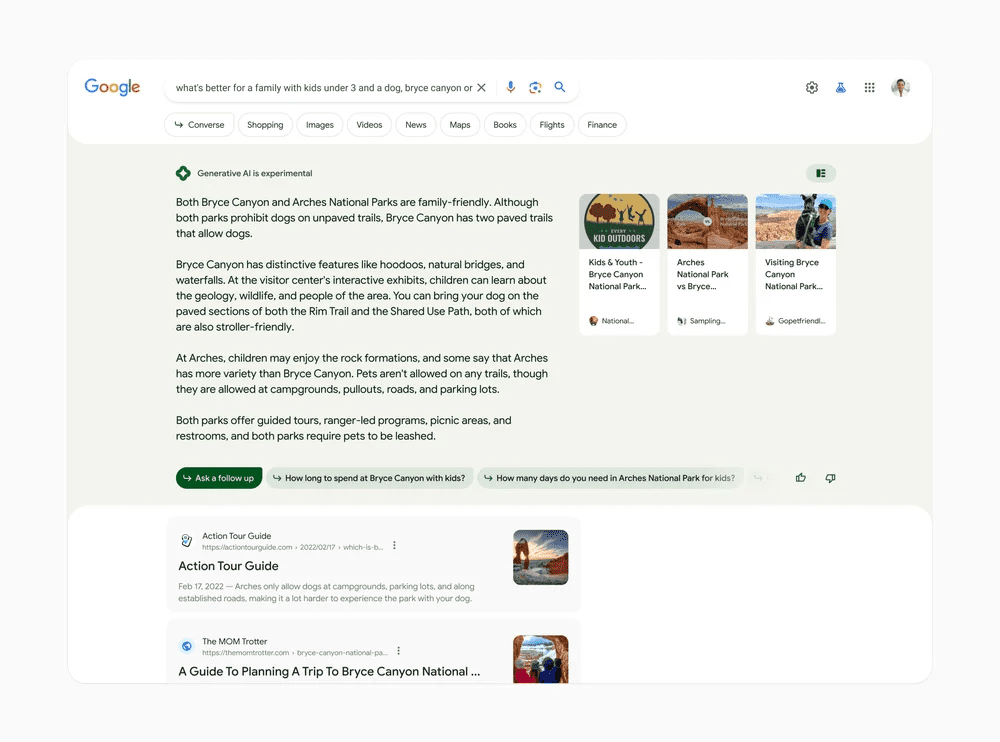Artificial Intelligence (AI) is currently a trending topic. We come across frequent announcements regarding AI products and solutions daily. It is likely to change the way we work. Recently Google announced generative AI in google search. In this article, we will try to understand if upcoming generative AI in Google Search is a genuine threat or not for bloggers or content writers.
History of AI
Many people are unaware that AI is not as new as they might think. Researchers around the world started exploring AI as early as the 1950s, and by the 1980s, they had already made significant progress.
Despite the advancements made during the 1980s, AI faced challenges such as funding cuts, inability to meet high expectations. Also, the hardware that was accessible at that time had limited computing capabilities and storage capacities compared to what we have now. This became a challenge for AI researchers and developers who needed a lot of computational resources to train and run complex AI models. Researchers had to make do with smaller datasets and simpler models because of the limited resources available. As a result, it limited the possibilities for exploring and developing AI applications in terms of their scope and scale.
High cost of computing hardware made it even more difficult for researchers to access AI research and development. It resulted in a decline in interest and support for AI for a significant number of years. In recent years there have been several developments that have helped overcome these issues. See the list below.
- Cloud computing platforms have reduced the barrier to entry for AI research and development by providing affordable and scalable computing resources.
- The availability of open source AI frameworks, such as TensorFlow and PyTorch have helped researchers to work on cutting-edge projects with limited resources.
- Advancements in hardware, such as GPUs and specialized AI chips, have made more powerful and affordable computing options accessible.
What made Google announce Generative AI in search?
It is important to understand the reasons that led Google to announce the implementation of generative artificial intelligence in their search engine.
Popularity of ChatGPT over Bard
In November 2022, OpenAI released a chatbot named ChatGPT with the promise of generating human-like responses. According to OpenAI, ChatGPT acquired one million users just 5 days since its launch, and by January 2023, it had reached 100 million monthly active users which makes it the fastest-growing application in history. After a few months of launch OpenAI released more refined version of ChatGPT which is based on GPT-4 and make it available for paid subscribers.Since the launch of ChatGPT there are over 20 Open Source generative AI large language models available for free. Some of these open source models perform better than Bard (Google's alternative to ChatGPT) in some of the tasks.
When Google released Bard in late March 2023, it was only available in the United States and UK. People had to first show their interest and join a waitlist before being granted access. Google announced during I/O conference that Bard will be available in other 180 countries.
Google Trends reveal that the popularity of Bard is still very low as compared to ChatGPT. Since Google I/O announcement it picked up but is still far behind than ChatGPT. ChatGPT also has an ecosystem around it. ChatGPT API and plugins have already been available for a few months. In simple words, ChatGPT can be integrated in most used softwares like MS Excel, MS Word etc. For example, you have companies names in a column in MS Excel and want to know the industries and locations of these companies. You can do it via ChatGPT API.

Safeguarding Market Share Against Bing's Threat
Microsoft's Bing Search Engine has made the premium ChatGPT-4 available for free, along with access to real-time information. Microsoft has added a new tab called Chat in their search engine. Bing has never gained this much attention in the past. Microsoft does not have much to lose in terms of market share in search engine. It's always Google that has to defend its dominance in the search engine. As of now, Google is miles ahead of its competitors. Please refer to the table below. Majority of Google revenue (~58%) comes from Google Search Ads.
| Search Engine | Market Share |
|---|---|
| 88.89% | |
| bing | 6.47% |
| Yahoo! | 2.32% |
| DuckDuckGo | 1.94% |
| YANDEX | 0.17% |
AI in Google Search: No Major Threat to Bloggers
Some people worry that AI will eventually replace bloggers and content writers. Their concerns have grown when Google showcased its upcoming AI-powered Google search engine at the I/O conference. Generative AI result will appear before any related links in Google search result. See the demo below.

If you take a closer look at the current Google Search Engine you may find that the threat posed by AI to bloggers is relatively limited. It's because of the already existence of featured snippets and the substantial percentage of Google's revenue derived from display ads. Let's get into some facts and numbers to gain a better understanding.
Featured Snippets
In Google, featured snippets appear at position zero, showcasing the best answer to a question above all other organic search results. They also include a link to the referring page. Featured snippets can take various forms, such as paragraphs, lists, or tables. In late 2017, Google reported an accuracy rate of 97.4 percent for featured snippets. Although recent data is unavailable, it is highly likely that the accuracy rate has further improved significantly in recent years.
Google's plan to replace featured snippets with Generative AI in the future aims to address complex search queries that featured snippets may not fully cover. Unlike featured snippets, generative AI results may not always display the referring URL. However, it is crucial to note that the accuracy of generative AI is currently not on par with featured snippets and may not reach that level even in the next few years.
Featured snippets have been in existence for over seven years, and if your blog has been receiving organic traffic in recent years, it is likely to continue doing so in the future.
Ad Revenue from Google Network Members
Google's revenue model majorly relies on advertising, with Google Network Members being a significant contributor (11.7%) higher than the YouTube Ads (10.4%). Google Network Members include advertising revenue generated from ads served on blogs/websites via Adsense, Ad Manager, AdMobs.
It is highly unlikely that Google would want to significantly reduce its advertising revenue from Google Network Members. If you believe that Google would prioritize increasing Google Search Ads to compensate for this potential loss, it's important to note that Featured Snippets and Tabbed Boxes in Google Search have already been in existence for many years. Generative AI result would be a replacement of these existing features.
Probable Slow Rollout of AI in Search
It took Google over seven years to achieve the milestone of having featured snippets appear on 23% of all search result pages. It is highly likely the integration of AI into Google Search will also be slow due to high infrastructure cost and inaccuracy in results. Google shows results in milliseconds even when there are billions of active users searching at the same time. Bard takes a couple of seconds even when there are not even million users using it. Slowing down the search results page by even a second will have impact on google revenue. Also Inaccurate search results on Google may prompt the need for government action against the company.
AI in Google Search: Who Should Be Concerned?
Generative AI in Google Search might be a concern for certain groups or industries. See the list below.
- Freelance Writers: Those who create content for bloggers and get paid per article might be concerned about the potential impact of AI-generated content. AI helps blog owners in writing content more efficiently and can contribute to improving grammar, style, and clarity. It may lead to a reduced demand for writers in the future.
- SEO professionals: The demand for SEO professionals may potentially decrease as AI-powered search engines prioritize content quality over traditional SEO practices.
- Bloggers specializing in specific niche topics: If the traffic to your blog has significantly decreased in the past few months, it may be due to users shifting towards ChatGPT and Bard instead of traditional Google Search for that particular topic. If this is the case, you might experience further impact in the future as Generative AI results start appearing in Google Search.


Share Share Tweet